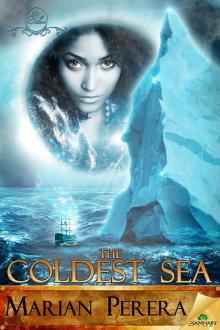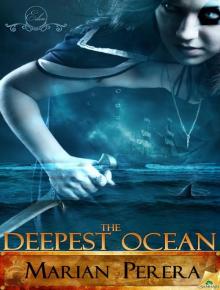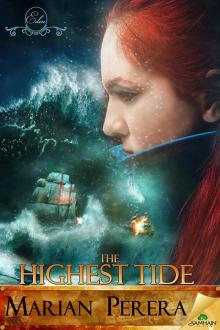- Home
- Marian Perera
The Coldest Sea Page 8
The Coldest Sea Read online
Page 8
“Talk,” he said as he took the flask back, “and we’ll put you in a room with something to cover yourself with.”
She blinked, squinting at him. “Can you tell me what’s happened first? Please.”
“That iceberg has us trapped. I’m guessing you’re the reason we haven’t been sunk.”
Her head moved wearily from side to side. “Not the only reason. We need a ship.”
“Why?”
“Why?” Her voice was raw, but there was a little more strength in it now. “To get off the iceberg, why else?”
“We would have done that for you!” Vinsen snapped. “We were prepared to help—”
“Ninety people?”
“What?” Joama said.
Ruay leaned back against the bulkhead. “Were you prepared to get ninety people off that iceberg and feed them all the way back to the mainland?”
“How the hell are you keeping ninety people alive?” Vinsen said. Obviously there couldn’t have been a shipwreck, but then—had they all deliberately climbed on an iceberg with enough supplies to last them for that time? To what end?
“With the Faith,” Ruay said.
“Try being more specific.”
She sighed. “You said you were trapped, but I didn’t feel the ship being struck. If the iceberg did something you never believed was possible, that was the Faith.”
Vinsen looked up at Joama, but she didn’t seem any more enlightened than he did. “So it’s like magic?” she said.
Ruay’s lip curled. “Magic is paltry compared to the Faith.”
“How so?” Vinsen asked.
“Iternan magic can affect water but not flesh. The Faith can master both.”
“More lies.” Joama’s lips compressed. “If you’ve got such powerful magic, why are you chained up and bare-arsed in our hold?”
“The Faith isn’t something one person alone can create,” Ruay shot back. “Why do you think there are ninety of us?”
Well, if that was true, it was one difference between the Faith, whatever the hell that was, and magic. He’d once watched a play about a witches’ coven, which needed thirteen people to be at its full strength, so maybe the Faith was like that. Not that Ruay would be cooperative enough to give them exact numbers.
“How does the Faith work?” he said.
“As it was written, so shall it be done. The Faith moves the world. The Faith makes us one.”
“I’ll ask again, and if I get any more sing-song, I’ll leave you to the rats. How does the Faith work?”
“You’re asking the wrong question.” Her eyes opened—not fully, but though the lids were swollen and reddened, her gaze was steady. “Take me to a room and give me a blanket, then I’ll tell you the right question.”
Vinsen considered, but there was only so much else he could do to her under the circumstances. Despite his ship being at stake, he couldn’t bring himself to hit her now that she was tied up and helpless, whereas if he had her moved to another room, she could be returned to the hold if she didn’t answer. So he led the way back to the deck above. Joama had gone ahead to secure a tiny room—more of a storage area—but Ruay didn’t seem to have any objections and huddled into a corner of it. Her wrists were chained in front of her now so she could hold a ragged blanket around herself. She was a sight, Vinsen thought dispassionately.
“What’s the right question?” he said.
Her vision had clearly been adapting, and she stared up at him. “What will we do next?”
“You’ll attack us to seize our ship. I hardly needed to ask that.”
“But now you know how many of us there are. And you have an idea what we can do.”
Yes, they could mold an iceberg as though it were clay, and they wanted Fallstar undamaged. The only question was what they could do to his crew. He went to one knee so he could look at her closely.
“You claimed this Faith can affect flesh,” he said. The deckhands would hear the answer anyway, but there were few secrets on a ship and he couldn’t hope to keep this one private for long. “What does that mean—that you can will us to die?”
Ruay made a raw gasping sound that might have been an attempt at laughter. “Oh, if I could you’d be rotting on the floor.”
There was a soft hiss of steel on wool-lined wood, and Joama drew a long-bladed knife. She leaned forward and pressed the tip into the hollow of Ruay’s throat, through the blanket.
“We’ll have a little more respect when we’re speaking to the captain of this ship,” she said, “and we’ll have it right now.”
A dark blot grew around the point of the knife and the blanket indented by it. Ruay tried to push herself back, but with her shoulders to the wall she had nowhere to go.
“Pardon me, Captain,” she said. Joama straightened up and sheathed the knife.
“Now answer the question,” she said.
Ruay swallowed, but the fear had gone from her voice when she answered. “The Faith is the reason we haven’t all frozen to death. It sustains us like an unseen fire, but like a fire it needs fuel. I imagine if h—if they willed you to die, that would consume more than we can spare. So yes, there will be a takeover of this ship, but I don’t think too much of the Faith will be expended on it. If you let me go, I’ll speak on your behalf and ask for mercy for your crew.”
“How kind. So we’d just be marooned on that iceberg, instead of being murdered for trying to help you?”
“It’s a hard world, Captain.”
Don’t I know it. He turned to the two deckhands. “Watch her. If she does anything strange, one of you keeps watching and the other one lets us know. Understood?”
They yessired him and he went to the nearest ladder. Joama fell into step beside him, matching his stride as they set off.
“My cabin,” he said. “Thank you for putting her in her place, by the way.”
“Least I could do for someone who believes my clothes are too good for her.” He thought under any other circumstances, she might have smiled. “I’ll pass the word for the others, shall I?”
“Do that. We have a defense to plan.”
Chapter Five
Blizzard
By the time the other officers had gathered in Vinsen’s cabin, he had a new map spread out—roughly drawn, but the only depiction they had of their surroundings, along with estimates of the dimensions of the water around them, plus the thickness of the ice wall. A dropped lead had told him the lake was little more than water filling a bowl of ice. Even if any of his crew could swim some distance under freezing conditions, it would have made no difference unless they could chip their way through the ice fifty feet beneath the ship.
Not that the Bleakhaveners would find Fallstar an easy target, though the ship’s resources were limited when it came to battle. He’d served on vessels armed with catapults and huge ballistae that shot tridents, which had given way to hellfire and cannons, but at that moment he would have given anything for a few more jars of pyre oil.
All the candles were clustered on the table, since their time was likely to run out before their tapers did. The officers seated themselves and Joama spoke first.
“I’ve had every blade sharpened, down to the cook’s carvers,” she said. “There are ropes and belaying pins too. We’re not going to be unarmed, whatever happens.”
“I suppose the attack will be tonight,” Dray said. “But is there any way to keep them from boarding in the first place?”
“Do we have nets?” All of Vinsen’s thoughts had focused on a shipboard battle, but he didn’t mind making it a little more difficult for the Bleakhaveners to get into the ship in the first place. At Joama’s affirmative nod, he went on. “Fasten those over the sides and the stern. They’ll find it time-consuming at best to cut the meshes, so it’ll deter them from climbing through a window.”
Though that would only delay the
Bleakhaveners. What he needed was some way to deal with them fast, rather than risking his crew in hand-to-hand battle on the deck.
“Isn’t there anything in the hold we could use?” Dray said hopefully. “In the cargo?”
Vinsen had seen the manifest. “It’s mostly food, Doctor.” Which boded well in terms of survival, but turnips caused surprisingly little damage when flung in battle, and enemies were more likely to die laughing. “Roots, spices and coal.”
“What about the infirmary’s supplies?” Joama said. “Dray, you won’t let anyone clean in there because of the chemicals.”
“They’re hardly likely to drink anything we give them,” Vinsen said.
She rolled her eyes. “No, Dray has something new. Breathe a whiff and you hit the deck.”
Vinsen thought that had potential but Dray shook his head. “They’re not going to considerately sniff any rags we hold out to them either,” he said. “And if you’re going to suggest simply flinging my entire stock of ether at them—well, we’ll just have to hope the wind doesn’t blow the fumes back in our direction. One spark will turn those into a fireball.”
“Could we make the water crossing too dangerous for them?” Evrett said. “If there were chunks of submerged ice, no one could row across to us.”
“If they can grow ice out of the water, they don’t need to row anyway,” Joama pointed out.
Vinsen stood up and rested his spread hands on the table. “They match us in numbers.” They also had their mysterious Faith, but that was such a wild card it was best not to design his strategy around it. Besides, if the Faith was all that precise and powerful, why bother with an attack? “A decisive victory where we destroy a significant portion of their strength might make them willing to discuss terms.” Or crush us to death, but either way, we’ll have shown them a Denalait ship isn’t easily taken. “To achieve such a victory, we’ll have to allow them to board.”
“And then attack?” Joama said.
“Yes, but I’d like to repel them in a way they don’t—”
“Sir.”
The tone of Dray’s voice stopped him as much as the interruption did. The doctor stared at the window behind Vinsen, and he turned sharply, in case the Bleakhaveners were about to smash through it. Nothing was visible except for the darkness beyond the glass and the reflections of flames on the surface.
Then he saw tiny, barely perceptible flickers of movement in the night. He unlatched the window and opened it a crack. A handful of flakes fluttered in like thistledown, melting before they touched the floor, but more swirled in with the wind before he slammed the window.
“It’s snowing,” Evrett said blankly, and Vinsen heard the question behind the words: Had the Bleakhaveners made that happen as well? Before the officers could say anything else, he spoke.
“Joama, tell the lookouts to stand down, and get all the lanterns off the deck.” The snow would cut visibility, and the lanterns would only give the Bleakhaveners something to aim at.
“Yes, sir.” She got to her feet.
Vinsen smiled. He didn’t need to make himself do so; it happened naturally when he saw just how much use heavy snowfall could be. Dray and Evrett stared at him, but Joama, already at the door, raised her brows as if to say, Share the secret.
“I have a plan for the anchor,” he said.
“Twenty of the men should be enough, Eldred.”
Artek Langwer’s voice was respectful, and he stood on the step of supplication as was his rightful place. But that didn’t make his request any more palatable. At his position on the highest point of the pyramid pedestal guarded by an armed man at each corner, Greoc Rund looked down at him and crushed an instinctive urge to refuse, because that was over half of Palemount’s strength.
“Twenty?” he said. “Do you see them as such a threatening enemy?”
Artek bowed his head, though Greoc wasn’t sure whether that was an attempt to show more subservience or to hide his reaction. “I thought it best to strike decisively, Eldred. We won’t be able to send word for reinforcements.” You shouldn’t need reinforcements, but before Greoc could say so, Artek went on. “And while Palemount will be guarded less heavily, none of the Denalaits know where this place is, or could find their way here if they did.”
That was true, not that Greoc feared the Denalaits. They weren’t the threat he was fleeing from; the rest of Bleakhaven was, and if they caught up with him, a thousand-strong garrison was unlikely to make a difference.
So, after a pause to make certain Artek would not take his approval for granted, he said, “Very well. Twenty.”
“Thank you, Eldred.” Artek bowed lower, then straightened.
Best to make certain he’d lose as few as possible. “Leave now. Once night falls, so will the snow. I’ll clear the sky perhaps an hour before dawn, but that will drive the Denalaits into cover while giving your men enough time to rest before the battle.”
It would be more than simply a snowfall—he’d create a howling blizzard, because the shipfolk would never have endured weather like that, normal winter conditions in the north of Bleakhaven. The scream of winds forceful enough to wrench children off their feet, and whirling, stinging clouds of crystals. But his loyalists would be wrapped in furs, their hands mitted and any exposed skin thickly greased. Striders strapped to their feet would allow them to walk over the snow without sinking in.
And most of all, they knew when the blizzard would end. The shipfolk would stay awake through the snowfall, watching, waiting, wearing themselves out, while Artek’s men would be rested and fresh for the attack.
The only danger was that the blizzard—and the battle—might leave the ship damaged, but he told Artek that if that were the case, he was to keep enough of the Denalaits alive to perform repairs and to show the Palemount garrison how to steer it. Artek knew his own shortcomings in that regard; he’d served as a guardsman all his life and had never stepped onto a deck. Well, all that would change soon, and anything was better than living on an iceberg.
“Ruay will tell us which among the crew we should spare,” Artek said. “The men should be ready, Eldred. With your leave—”
Greoc nodded and the door-warden let Artek out. Unlike him and those twenty men, Greoc wouldn’t sleep at all during the night. He had to draw on the Faith to maintain his awareness of their progress over the iceberg, and to sift the snow down like a silent dry rain before he fanned the wind into a blizzard.
Now that he came to think about it, he couldn’t remember the last time he had slept. He depended on the Faith to keep him rested and alert, though none of the Eldred would have dreamed of doing that in Bleakhaven. There, the Faith was gathered and used for a single purpose or deed, rather than being tapped constantly for sheer survival.
But despite the risks of what he was doing, he didn’t have a choice. Besides, after they succeeded, he wouldn’t need to go to such lengths again. Once they were all away from the iceberg, he would be in no danger of exhausting the source of the Faith which waited, silent and unsleeping, in the vault.
It would all be over before long. The half-light, an indistinct glow that was never either noon or night, gleamed softly off ice and marble as he thought of what they would do. He’d leave the iceberg as it was, to give his pursuers something to track down. Perhaps he’d alter the corpses of the Denalaits to look like him and his followers; the possibility of that trick succeeding made him smile.
By the time anyone caught up with the iceberg and searched its vastness, he and his followers would be long gone, escaped on a ship that was like any other vessel in the Denalait fleet.
As soon as that ship was his.
Vinsen couldn’t feel his hands any longer. They’d ached dully, despite a pair of fur-lined gloves and a layer of soft wool beneath, but now they were numb. He forced his fingers to open and close, trying not to think of the possibility of frostbite. A sc
arf was wrapped around his mouth and nose, but every exhalation had left the wool stiff with ice crystals.
It wasn’t as though he was the only person on the deck. Well, technically he was, because the hatch was closed under a layer of snow, but he had stationed six men in the rigging, two to each mast. He only hoped they hadn’t frozen to death. Unlike him, they couldn’t even move around.
One of the boats had been placed upside-down across the ship at the stern, where he was. Atop it was the anchor, balanced carefully against the boat’s keel and the capstan, a positioning that had taken the crew well over an hour to perfect. Vinsen was grateful for the boat, because he’d crouched beneath it for most of the night as the blizzard howled. It wasn’t any warmer there, but the hull shielded him from the worst of the wind.
When that finally stopped, the sheer silence was like cotton stuffed in his ears. Clenching his fingers, he half-crawled and half-burrowed out through the snow. A crate beside the boat was little more than a pallid mound. Holding on to the boat for balance, he got to his feet, feeling ten years older, and looked at his ship.
Fallstar was unrecognizable beneath a white blanket deeper than velvet. Snow so thick they might have been buried alive. Stop that, Vinsen thought. He knew very well the Bleakhaveners had done it to drag his crew’s morale lower, but his mind felt as sluggish as his blood. Drifts of snow lay along the deck, piled up around the nearest mast—all he could see in the moonlight.
He lifted his head and a handful of weight fell from the hood of his jerkin. Every rope of the rigging was furred. He couldn’t see the men in the masts, but he imagined they were humped indistinct shapes, curled onto themselves to keep in the last drops of warmth. They would have tied themselves in position, so even if they lost consciousness or died, they would remain there, at their posts, as they had been ordered.
After the blizzard, the silence was fragile and hushed. Vinsen’s limbs felt stiff and awkward, as much from his layers of clothing as from the cold, but that was more bearable now that the wind had died.
He glanced around. On either side of the hull, taut ropes ran from the rail to makeshift pitons driven into the ice wall, to hold the ship as steady as possible. Those ropes dripped gobs of snow as well, but strong as it was, the blizzard hadn’t ripped any of the iron spikes out of the ice.

 Christmas Yet To Come (The Ghosts of Christmas)
Christmas Yet To Come (The Ghosts of Christmas) Christmas Yet to Come
Christmas Yet to Come The Coldest Sea
The Coldest Sea The Beast Prince
The Beast Prince The Deepest Ocean (Eden Series)
The Deepest Ocean (Eden Series) The Highest Tide
The Highest Tide